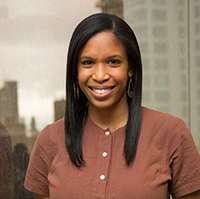
I think that many of us can agree that philanthropy is powerful. But for who? What communities benefit from generations of concentrated wealth? How can we shift power dynamics within philanthropy to address the root causes of inequity? These are the questions that I continue to ask myself in my role with The Giving Practice at Philanthropy Northwest.
As a senior analyst, I support client engagements by analyzing quantitative and qualitative data, conducting research and presenting findings that drive action. Each day, I have the unique opportunity to work with private, public and family foundations as they integrate an equity lens into their work, infuse their grantmaking strategy with trust-based practices, and build a more inclusive and diverse board and staff.
I joined The Giving Practice after completing my master’s in public health at the University of Washington, where I focused on reproductive justice and cancer prevention. During my graduate studies, I dedicated a significant portion of time to understanding the social determinants of health and the impacts these determinants have on communities, particularly communities of color. This nuanced understanding of what causes poor health pushed me to work upstream in order to change the social and economic conditions that impact health. This allowed for me to find a home in philanthropy.
However, there is more than my academic background that makes me excited to join the philanthropic sector. I grew up outside of Richmond, Virginia, the capital of the confederacy. Each day on my way to high school, I drove down Monument Avenue, a tree-lined street adorned with statues memorializing Virginian Confederate veterans who died fighting for the south during the Civil War.
The history of my hometown paired with my background as a woman of color who has studied health inequities shapes how I view my place within the philanthropic sector. I hope to play an integral role in how we build power, income and wealth for communities who have been excluded from opportunity due to oppression and systemic racism. I believe that philanthropy can be used as a tool in this effort, but it takes more than good intent. It takes careful attention to the communities we are and aren’t uplifting through our work and commitment to sit with the truth of our sector’s wealth and the discomfort that may coincide.
I am grateful for the opportunity to bring my perspective to philanthropy in the northwest and I look forward to continuing to grow within my role at The Giving Practice. In the coming months and years, I will continue to ask questions about who philanthropy is serving and how philanthropy is getting to the root of social injustices. It is a small but important role that I hope to play.
